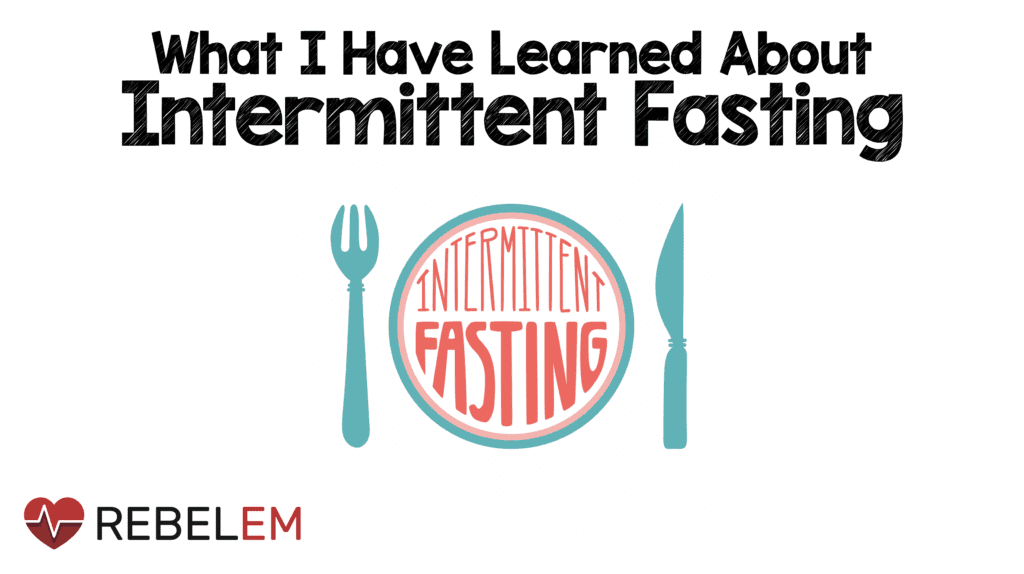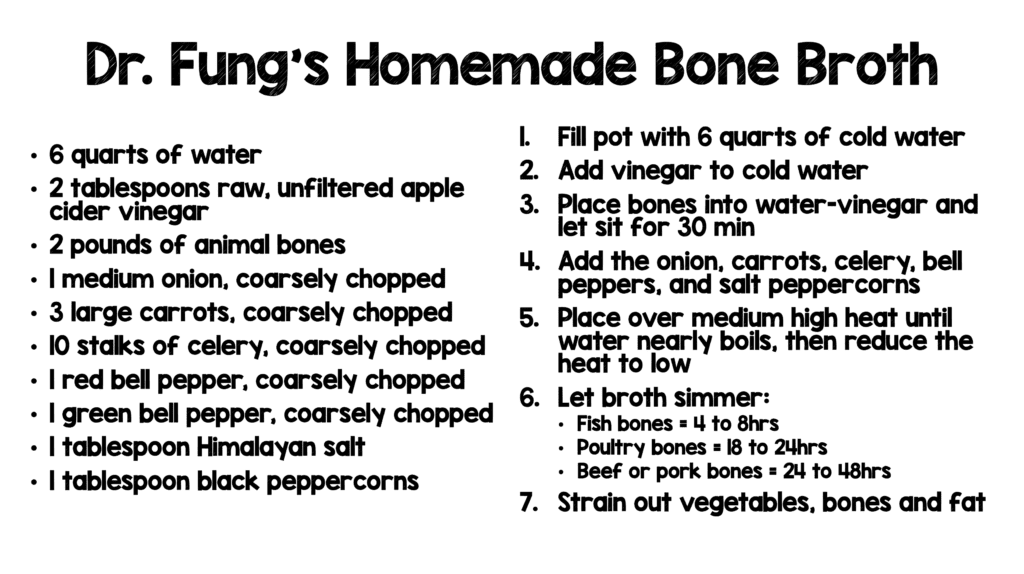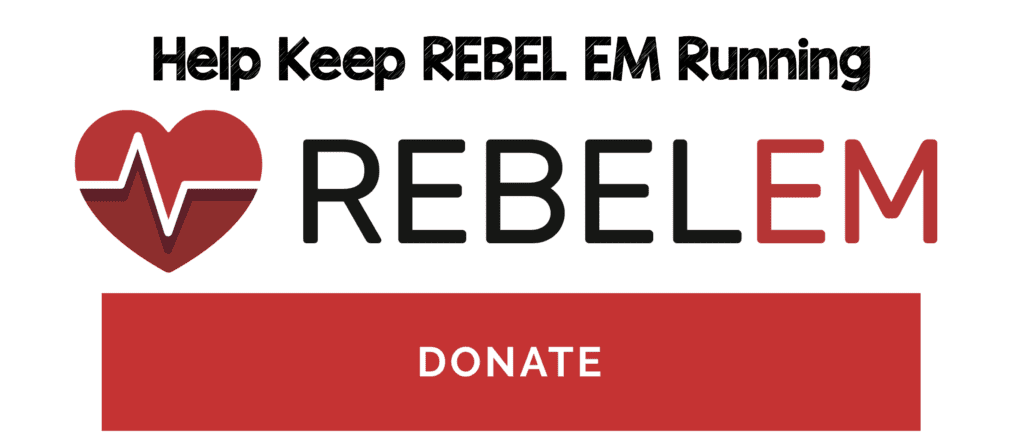
Let me start off by saying, this is not a typical blog post for REBEL EM. This is a post about a personal journey for me. Anyone who follows me on my personal Facebook page knows I have been on a journey toward a healthier life over the past 4 years or so. I used to weigh 240lbs (109kg) and was able to get my weight down to 205lbs (93kg) with carefully changing my diet and being more cognizant of my daily exercise. I however hit a plateau. As my journey has continued, I began to read a lot more about intermittent fasting. I figured let’s give it a shot. Well, the rest as they say is history. The transformation has been amazing with a further drop in my weight to 180lbs (82kg). As I have been sharing this with others, I have received lots of questions about this and wanted to share what I have learned about it in the hopes of helping others realize their own health journey. First let me start off by saying if you want to learn more consider reading The Complete Guide to Fasting (Heal Your Body Through Intermittent, Alternate-Day, and Extended Fasting [Link is HERE]. This is a phenomenal book on all the ins and outs of intermittent fasting and I highly recommend it for anyone interested in this topic.
What if I told you that you can lose weight, boost brainpower, slow aging, and improve heart health without any drugs or supplements? If metabolic diseases are caused by eating too much, then isn’t the easiest solution to eat less? A healthy life does not require living at the gym. Fad diets and temporary solutions may work initially, but if you can’t sustain them, then they can’t become part of your everyday lifestyle.
Let’s Start With Some Myths About Intermittent Fasting
- Fasting Puts You in “Starvation Mode”
- “Starvation Mode” refers to the notion that metabolism slows down in response to fasting
- In one study [2], 11 healthy lean subjects fasted for 4d straight
- Weight decreased 2.7kg
- Resting energy expenditure increased
- Norepinephrine increased
- Glucose decreased
- Exercise capacity increased
- Fasting Makes You Burn Muscle
- When food is not available body fat, not muscle is used as energy. Muscle is preserved until body fat becomes so low that the body has no choice but to turn to muscle (Typically when body fat ≤4%)
- During fasting, the body switches from burning carbohydrates to fat for energy and protein is spared [3]
- Increased growth hormone helps maintain lean body mass (muscle and bone)
- In another study [4], 16 obese adults participated in a 70d alternate day fasting trial
- Total body weight decreased 5.6kg
- Fat mass decreased from 43.0kg on day 1 to 38.1kg on day 70
- Fat-free mass remained unchanged from 52.0kg on day 1 to 51.9kg on day 70
- Fasting Causes Low Blood Sugar
- Fasting longer than 24 to 36hrs causes a depletion in glycogen stores, but the liver now produces new glucose from gluconeogenesis, using glycerol which is a breakdown product of fat
- Essentially, we do not need to eat glucose for our blood glucose levels to remain normal
- Fasting Deprives the Body of Nutrients
- There are two types of nutrients: Micronutrients (vitamins and minerals) and macronutrients (carbohydrates, proteins, and fat)
- Macronutrients:
- It is impossible to become carbohydrate deficient as discussed above
- There are some essential proteins and fats that we do have to get in our diet. Eating nutrient dense foods can make up for this
- Micronutrients
- It is probably a good idea to take a multivitamin daily to prevent vitamin deficiencies
Advantages of Intermittent Fasting
- It’s Simple: Basically, eat nothing for a duration of time and drink water, tea, coffee, or bone broth
- It’s Free: The price of fasting is zero dollars
- It’s Flexible: It can be done at any time for any duration
Who Shouldn’t Do Intermittent Fasting
- Malnourished/Underweight
- Age <18 years
- Pregnant or breastfeeding women
- If you have type 1 or 2 diabetes would talk to your physician before starting (It can be done, but medications have to be adjusted)
Let’s Talk Insulin
- Insulin is not only a glucose hormone but also a fat storage hormone (Store some food energy as fat for later use)
- Excessive insulin causes
- Obesity
- Insulin Resistance
- How do we reduce insulin levels?
- Ketogenic Diet (Low-carb, moderate-protein, high-fat diet)
- Reducing insulin levels by changing eating habits is hard in a busy fast-paced world
- Intermittent Fasting
- Simple solution = Eat nothing at all (i.e. intermittent fasting)
- Being in ketosis teaches your body to burn fat for fuel rather than sugar
- Eat Food –> Increase Insulin –> Store sugar in liver + Produce fat in liver
- No Food “Fasting” –> Decrease Insulin –> Burn stored sugar + Burn body fat
- Ketogenic Diet (Low-carb, moderate-protein, high-fat diet)
- Excessive insulin causes
5 Stages of Metabolism and Fasting
- Transition from fed state to fasting state
- Feeding: Blood sugar and insulin rise; glucose converted to glycogen in liver or in excess converted to fat
- Postabsorptive phase (6 to 24hrs after beginning fasting): Blood sugar and insulin decrease; glycogen broken down releasing glucose (Glycogen stores last for 24 to 36hrs)
- Gluconeogenesis (24hrs to 2d after beginning fasting): Glycogen stores have run out; New glucose manufactured from recycled essential fats and amino acids
- Ketosis (2 to 3d after beginning fasting): Low insulin levels stimulate lipolysis (breakdown of fat for energy)
- Protein conservation phase (5d after beginning fasting): Energy for basic metabolism almost entirely supplied by fatty acids and ketones
- During the initial stages of fasting, insulin and blood glucose levels fall but remain in the normal range, maintained by the breakdown of glycogen as well as gluconeogenesis. After glycogen is used up, the body begins to switch over to burning fat for energy. Longer duration fasts reduce insulin more dramatically, but you still need to burn up your glycogen stores before you can use fat for energy (Two forms of energy cannot be used simultaneously but can be used sequentially).
Other Benefits for Me:
- Mental clarity (i.e., no postprandial comas)
- Improved focus/concentration
- Improved memory
- Improved attention
- Improved reasoning
- Improved mood
The Beginning Can be Hard
- Consider starting with a low-carb diet for a period of time before starting intermittent fasting (This is like stretching before you workout)
- My personal experience has been that the first 2 days are the hardest, but after this hunger diminishes without any urges to want to overeat
- Don’t start cold turkey. Replace mindless eating with only eating at the dinner table (Replacing one habit for another habit)
- Hunger is not constant. It comes in waves, so set yourself up to ride out the wave by keeping yourself busy when starting out. You won’t even remember to be hungry
- Create a list of activities that will keep you busy and put it on your refrigerator (i.e. walking, cleaning, exercising, etc..)
- Drink green tea or black coffee to suppress your hunger
- It’s hard at first, but like many things, the more times you do it, the easier it gets
- Fit fasting into your life, don’t change your life to fit your fasting
What is Allowed During a Fast
- Water (2L/day)
- Tea (Especially green tea)
- Black coffee (Up to 6 cups per day)
- 1 to 2 teaspoons of coconut oil or cinnamon are allowed, but technically not part of a true fast
- Medium-chain triglyceride oil
- Homemade bone broth
- Sea salt
- There is disagreement about artificial sweeteners

Types of Intermittent Fasting
- There is no best regimen (I currently do the 20hrs of fasting with 4hrs of eating with my window to eat from 6pm to 10pm)
- There is some evidence that eating earlier in the day may be better for weight loss (Between 12p and 4p) rather than eating later in the day
- With my chaotic shift work schedule, it was too hard for me to eat between 12p and 4p. 6p to 10p is what worked best for me
- The longer the fast, the bigger the benefit
- If you do not feel well at any point, stop the fast (You can be hungry, but should not feel sick)
- 12hr fast: Can still eat 3 meals a day
- 16hr fast: Can still eat 2 meals a day; Majority of your fast will be while you are sleeping
- 20hr or 24hr fast: Can still eat 1 meal a day; Benefit is if you take medications that require food, this can still be done daily (i.e. metformin, aspirin, iron supplements, etc…)
- 5:2 fast: Five normal eating days. On the other two fasting days decrease caloric intake to 500 or 600 calories per day. This is a nice way to ease into intermittent fasting
- Alternate day fast: As the name suggests you fast every other day
- 36hr fast: Do not eat for one entire day (i.e. Dinner at 7pm on day 1, no meals on day 2, breakfast at 7am on day 3)
- Extended fasts:
- The longest fast on record is 382 days straight!!! [5]
- Will need homemade bone broth and/or multivitamin to ensure balance of vitamins and minerals
- 2 to 3d fast
- 7 to 14d fast
We Can’t Fast Forever (General Rules)
- Eat Whole, Unprocessed Foods: Food that is recognizable in its natural state as something that was alive or has come out of the ground
- Avoid Sugar and Refined Grains: Processed Foods; In a wrapper or a box; Flour or Corn Products
- Eat More Natural Fats: Olive Oil, Nuts, Avocados, Wild Salmon
- Eat Less Artificial Fats: Corn and Canola Oils
ADDENDUM 01/05/2021

The TREAT trial [6] has been messaged to me several times today, so I figured I would add it here at the end of the post. This was a randomized clinical trial of overweight patients who were randomized to intermittent fasting (16:8hr time-restricted eating) vs consistent meal timing (3 meals per day). The trial duration was 12 weeks and there were 116 participants randomized. The critical results…
Time restricted eating was associated with a 1.17% decrease in weight which was not that significantly different from the control group which was 0.75%.
The authors concluded, “Time-restricted eating, in the absence of other interventions, is not more effective in weight loss than eating throughs the day.”
This trial makes it sound like intermittent fasting doesn’t work, but not so fast. There are several reasons why the results of this trial don’t mean anything:
- In obese patients with metabolic syndrome, 12 weeks is simply not enough time to see any significant results (It takes time to switch from burning glucose to burning fat)
- Longer fasting periods of >16hrs are needed to see results in 12 weeks
- Zero calorie sodas and non-sugar sweeteners were allowed which is controversial in this diet
- No recommendations were made on what macronutrients to consume when eating
- Compliance was documented in surveys (People lie all the time about what they eat)
- The comparator was 3 meals per day. However a recent poll in the US [Link is HERE] shows that most people are eating 5x/day.
So although we do have a randomized controlled trial that showed no benefit, the devil is in the details. This trial was doomed for failure before it was ever started.
References:
- Fung J et al. The Complete Guide to Fasting (Heal Your Body Through Intermittent, Alternate-Day, and Extended Fasting). Victory Belt Publishing Inc 2016. [Link is HERE]
- Zauner C et al. Resting Energy Expenditure in Short-Term Starvation is Increased as a Result of an Increase in Serum Norepinephrine. AM J Clin Nutr 2000. PMID: 10837292
- McCue MD. Comparative Physiology of Fasting, Starvation, and Food Limitation. Springer 2012. [Link is HERE]
- Bhutani S et al. Improvements in Coronary Heart Disease Risk Indicators by Alternate-Day Fasting Involve Adipose Tissue Modulations. Obesity 2010. PMID: 20300080
- Stewart WK et al. Features of a Successful Therapeutic Fast of 382 Days’ Duration. Postgraduate Medical Journal 1973. [Link is HERE]
- Lowe DA et al. Effects of Time-Restricted Eating on Weight Loss and Other Metabolic Parameters in Women and Men With Overweight and Obesity: The TREAT Randomized Clinical Trial. JAMA Intern Med 2020. PMID: 32986097
Post Peer Reviewed By: Anand Swaminathan, MD (Twitter: @EMSwami)





